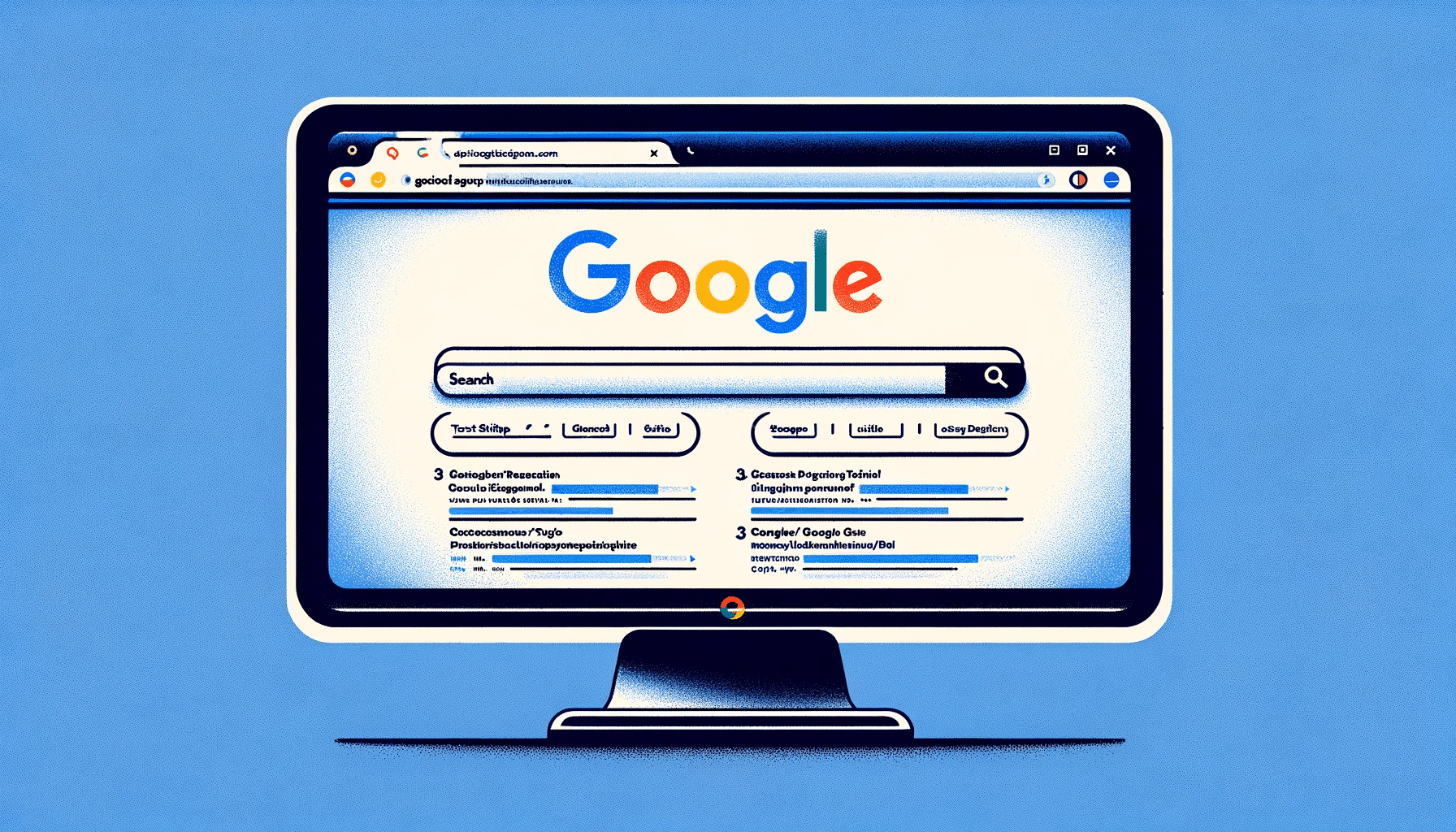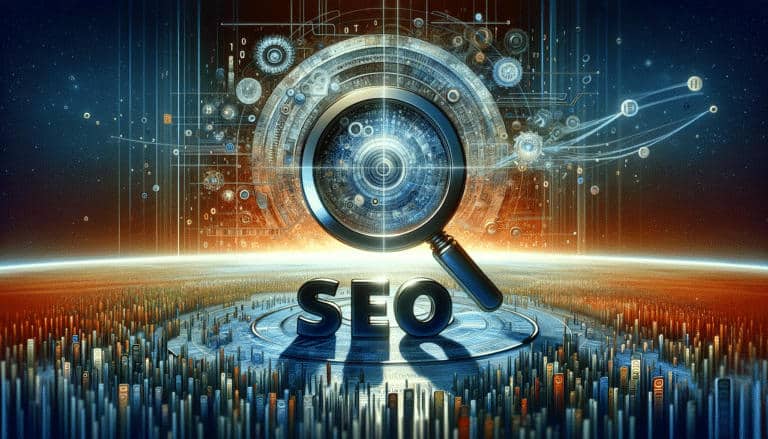A thriving business is often a visible business. In the age of the internet, this visibility occurs on search engines, like Google, Bing, or Yahoo. But the competition is fierce. To carve out a spot, it is crucial to approach the right strategy, namely SEO. In this article, we explain what it involves, and also the upheavals brought about by Artificial Intelligence.
What is SEO?
SEO stands for Search Engine Optimization. In practice, it involves implementing various strategies to display a website’s pages as high as possible in the organic search results (non-sponsored) of search engines or SERPs (Search Engine Result Pages), particularly the first position. The development of an SEO strategy is based on 3 fundamental pillars:
- Technical aspects: this encompasses the site’s architecture. Factors such as load time, Hn tags, meta tags, redirects, and others are vital.
- Content: to enhance their rankings, companies must furnish high-quality content (text, image, video, audio, etc.) while facilitating search engines’ comprehension of the content’s purpose. Key to this is selecting a primary query (aligning with the user’s search intent) and tailoring the content to meet that search intent optimally.
- Links: this includes all internal and external links. Internal linking structures the site’s overall architecture, enhancing navigation. Conversely, external links originate from third-party sites, lending authority to the site.
An additional fourth pillar worth mentioning is user experience.
What's the difference between SEO and SEA?
Similar to SEO, SEA (Search Engine Advertising) enables websites to position links to their pages as prominently on the SERP as possible. However, unlike the organic or natural results, SEA encompasses sponsored or paid results, in essence, ads. The placement of these paid results within the SERP relies on an intricate auction system, typically pay-per-click or CPC (Cost per Click).
Employing this method allows for a significantly quicker ascendance to the top position. SEA can secure results much more expediently than SEO, which often demands months, if not years, of effort before yielding visibility.
However, SEO and SEA are not mutually exclusive, with an effective search engine marketing or SEM (Search Engine Marketing) strategy typically incorporating both. SEA facilitates short-term outcomes, whereas SEO ensures lasting visibility.

What is the difference between on-page and off-page SEO?
The optimisation techniques used in on-page and off-page SEO are different. In on-page SEO, you work mainly on your website, optimising tags, content, URLs, etc. Off-page SEO, on the other hand, concentrates on external actions. Off-page SEO, on the other hand, focuses on actions outside your site, such as creating backlinks and having a presence on social networks.
On-page SEO: optimising the content and technical aspects of your pages
On-page SEO consists of optimising the content of your web pages as well as the technical aspects of your site. This includes the choice of keywords, their variations and their placement in the relevant tags. It also includes page layout, fluidity of navigation, loading time and UI/UX (user interface and user experience). Although on-page SEO is the most obvious part of SEO, it requires specific technical knowledge, and for more advanced SEO, the use of online tools makes it possible to build up a reservoir of relevant keywords to be used throughout the life of your site. Although this part of SEO is essential, it is not sufficient on its own to guarantee good referencing.
Off-page SEO: everything that happens outside your website
Off-page SEO covers all the actions taken outside your website to improve its SEO. This includes the search for backlinks pointing to your site, as well as its promotion on social networks and other media. These external actions are crucial for boosting your site’s authority and visibility.
What is the impact of the development of Artificial Intelligence on SEO?
Following the late 2022 surge of ChatGPT, SEO experts have been closely scrutinizing the evolution of Artificial Intelligence. Does this spell the end for search engines as we know them? Will AI supplant the tasks of natural referencing professionals?
The end of Google's monopoly?
The rise of ChatGPT has sent shockwaves through Google. Notably, even without accessing the internet, this conversational tool has been able to address users’ questions with remarkable accuracy. However, Google’s prime objective is identical—answering users’ inquiries. While to this point the company has enjoyed a clear monopoly, it now faces formidable competition.
Moreover, OpenAI (backed by Microsoft) isn’t the sole player in the AI arena. From tech behemoths to burgeoning startups, numerous entities are also forging ahead with their Artificial Intelligence innovations. Such developments could radically transform consumer behaviors regarding online searches. Search engines are experiencing disruption, with Google at risk of ceding its dominion.
Generative AI on Google Search
At the Google I/O conference in May 2023, the online powerhouse revealed plans to integrate generative AI into search outcomes. Google Search will now feature Artificial Intelligence-generated results in the foremost position. This initiative aims to furnish web users with an expansive array of responses to their queries. With this innovation, SEO-driven content subsequently moves to a secondary role. Nonetheless, Google executives strive to persist in directing traffic towards websites. Amidst these shifts, SEO professionals are compelled to adapt.
Artificial Intelligence, an assistant rather than a substitute for humans
According to a Goldman Sachs report, AI currently poses a threat to approximately 300 million jobs worldwide. Should SEO specialists be concerned about their future?
The response is no; Artificial Intelligence has not yet reached a juncture where it can supplant human beings. Whether for devising a meticulously crafted natural referencing strategy or generating premium content, human intellect remains indispensable. Despite advancements in natural language processing, there persists a discernible disparity between machine-generated texts and those authored by humans. Generative AI isn’t intended to replace SEO experts or agencies. Rather, this technology can serve as a boon for natural referencing professionals, assisting with tasks such as proposing title ideas, crafting article frameworks, or uncovering keywords. Therefore, it’s imperative to embrace and acclimate to this novel instrument.
AI, a constant presence in SEO
While Artificial Intelligence is advancing rapidly, it has always held a role within SEO. At Google, this is manifested through LaMDA (Language Model for Dialog Applications), an algorithm enabling search engines to grasp the essence of a web page’s content. As AI progresses, Google’s capability to address the search intents of users, even the most intricate inquiries, is enhanced. Through its varied algorithm computes, the internet titan is optimizing its efficacy—and all thanks to AI.

Key takeaways
- SEO empowers businesses to elevate their search engine rankings naturally.
- In contrast, SEA involves investment in sponsored links for prime SERP positioning.
- While SEO is a cornerstone of inbound marketing strategy, it may experience significant transformations due to the advancements in Artificial Intelligence.










